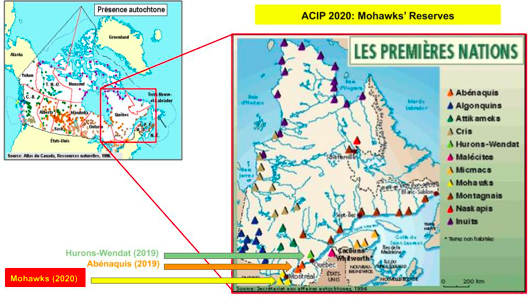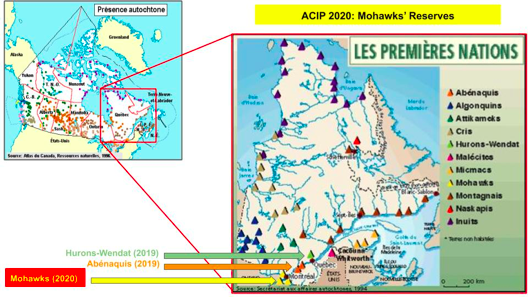WARNING: All the AIC 2020 activities will be postponed to new dates 
Description:
**French version is below**
The 2019 AIC pilot project previously named Astronomy for Canadian Indigenous People (ACIP) project was a great success. The Indigenous youth who participated were excited by the presentations and experiences prepared by the CFHT resident astronomer Dr. Rousseau-Nepton (the first indigenous woman in Québec to obtain a PhD in astrophysics) and Mary Beth Laychak (CFHT Outreach manager). The visit to the Popular Astronomy Festival of Mont-Mégantic was like a dream for the youth. Presentations, animations and observation with small telescopes and through the eyepiece of the 1.6m Mont-Megantic telescope was fantastic. A few students clearly manifested their interest to become an astronomer or an astronaut (there were presentations on the Apollo missions).
Based on the success of our Pilot Project in 2019, we propose to follow the same society-society approach to improve the situation of Indigenous people in Canada by using Astronomy as a tool for the development of Indigenous youth. This novel non-governmental approach could have an impact in reducing inequality in the society.
For this Project, we will target three Mohawks' communities in the Province of Québec near the city of Montréal. This geography leverages proximity to the Mont-Mégantic Observatory, one of the premier research telescopes in Canada. Our participants will be young students (8-14 years old). For this year, our project has three components: (i) visiting schools in the Indian reserves to reach young Indigenous students; (ii) visiting the Rio Tinto Alcan Planetarium in Montreal; (iii) bringing a group of students to visit the Observatory of Mont-Mégantic during the Popular Astronomy Festival of Mont-Mégantic, and (iv) Connecting teachers from Indigenous schools to Discover the Universe program, which provides online teacher training in astronomy. We will use Astronomy as a social development tool to help improve the situation of Indigenous people in Indian reserves.

THANK YOU TO OUR SPONSORS AND COLLABORATORS
——————————————
Description (French version):
Le projet pilote ACIP 2019 a été un grand succès. Les jeunes autochtones qui ont participé ont été enthousiasmés par les présentations et les expériences préparées par l'astronome résident du CFHT, le Dr Rousseau-Nepton (la première femme autochtone au Québec à obtenir un doctorat en astrophysique) et Mary Beth Laychak (responsable de la sensibilisation au CFHT). La visite du festival d'astronomie populaire du mont Mégantic était comme un rêve pour les jeunes. Les présentations, les animations et l'observation avec de petits télescopes et à travers l'oculaire du télescope de 1,6 m du Mont-Mégantic étaient fantastiques. Quelques étudiants ont clairement manifesté leur intérêt pour devenir astronome ou astronaute (il y avait des présentations sur les missions Apollo).
Compte tenu du succès de notre projet pilote en 2019, nous proposons de suivre la même approche société par société pour améliorer la situation des peuples autochtones au Canada en utilisant l'astronomie comme outil de développement des jeunes autochtones. Cette nouvelle approche non gouvernementale pourrait avoir un impact sur la réduction des inégalités dans la société.
Pour ce projet, nous ciblerons trois communautés Mohawk dans la province de Québec, près de la ville de Montréal. Cette géographie tire parti de la proximité de l'observatoire du Mont-Mégantic, l'un des plus importants télescopes de recherche au Canada. Nos participants seront de jeunes étudiants (8-14 ans). Notre projet comporte trois volets: (i) visiter des écoles dans les réserves indiennes pour atteindre les jeunes étudiants autochtones; (ii) visiter le planétarium Rio Tinto Alcan à Montréal; (iii) amener un groupe d'étudiants à visiter l'observatoire du Mont-Mégantic lors du Festival d'astronomie populaire du Mont-Mégantic; et (iv) connecter les enseignants des écoles autochtones à Julie Bolduc-Duval, la directrice du programme Discover the Universe qui offre une formation en ligne aux enseignants en astronomie. Nous utiliserons l'astronomie comme outil de développement social pour aider à améliorer la situation des peuples autochtones dans les réserves indiennes. Dans ce projet, nous utiliserons l'astronomie comme outil de développement social pour améliorer la situation des peuples autochtones dans les réserves indiennes.

MERCI A NOS SPONSORS ET COLLABORATEURS